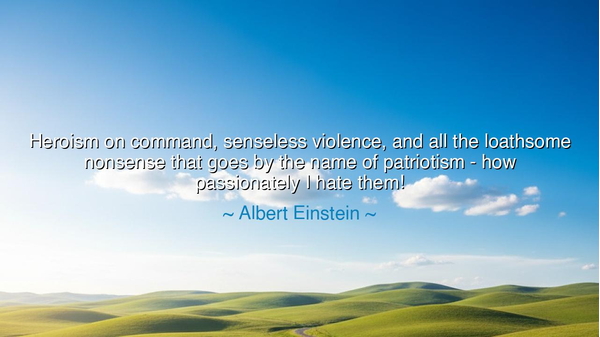
Heroism on command, senseless violence, and all the loathsome
Heroism on command, senseless violence, and all the loathsome nonsense that goes by the name of patriotism - how passionately I hate them!






Hearken, children of the future, and attend to the vehement words of Albert Einstein, who declared, “Heroism on command, senseless violence, and all the loathsome nonsense that goes by the name of patriotism—how passionately I hate them!” In this proclamation lies the eternal warning that patriotism, when corrupted by blind obedience or misdirected zeal, becomes a weapon of destruction rather than a virtue. Einstein’s soul recoils at the spectacle of valor divorced from conscience, at acts of violence committed in the name of nationhood without thought, justice, or humanity.
The origin of this reflection lies in Einstein’s life amid the turmoil of the twentieth century, a period scarred by world wars, fascism, and the mechanized destruction of human life. Having witnessed the horrors of conflict and the moral abdication of obedience, Einstein condemned the hollow heroism and mindless violence that masqueraded as loyalty to the nation. His words remind us that true patriotism cannot be measured by participation in conflict alone, but by the ethical and rational application of love for one’s fellow citizens and respect for life.
Consider the historical example of the soldiers conscripted during World War I, compelled to march and fight under orders that often led to senseless slaughter. Many acted with courage, yet Einstein’s condemnation targets the unquestioning obedience, the “heroism on command,” that led young men into the mud and blood of futile offensives. Patriotism, when stripped of moral reflection, becomes a tool of cruelty, a vehicle for the whims of power, rather than a force for justice or the common good.
Einstein’s words illuminate a profound moral distinction: the love of country must be tempered by reason, ethics, and compassion. Blind obedience to nationalistic fervor, or the glorification of violence in the name of patriotism, erodes the very humanity it claims to defend. True heroism is not performed at the command of authority alone, but in the service of justice, liberty, and the protection of the innocent.
In the modern era, Einstein’s warning resonates in the critique of war, propaganda, and the manipulation of public sentiment. When nations glorify violence or demand unquestioning obedience, citizens are at risk of becoming instruments of destruction. Ethical patriotism requires reflection, critical thought, and courage—the courage to question, to dissent, and to uphold the principles that justify loyalty to the nation.
From this reflection flows a practical lesson: cultivate moral discernment and critical awareness in all expressions of loyalty. Serve your country not blindly, but thoughtfully, ensuring that your actions strengthen justice, protect the vulnerable, and honor human dignity. Reject violence enacted without conscience, and recognize that true patriotism is a partnership between love of nation and adherence to eternal principles of morality.
Moreover, teach others the difference between ethical patriotism and its perversions. Encourage civic engagement, debate, and moral courage, ensuring that loyalty is expressed through reasoned action, not blind obedience. In this way, the nation is guided by conscience and principle, rather than the passions of the unreflective or the cruelty of power.
Thus, children of tomorrow, inscribe upon your hearts this eternal truth: patriotism devoid of conscience, ethics, or reflection is destructive, while true loyalty demands wisdom, justice, and compassion. Let your devotion to the nation be informed by reason, guided by morality, and exercised in the service of life and humanity. In heeding Einstein’s warning, you honor both your homeland and the enduring principles that safeguard civilization from the loathsome nonsense of senseless violence.






AAdministratorAdministrator
Welcome, honored guests. Please leave a comment, we will respond soon